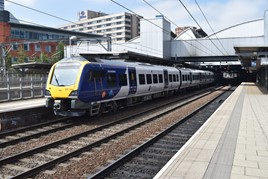- This Analysis article was published in RAIL 861, and is available digitally.
There’s a widespread belief that foreign governments benefit considerably from their state railway companies running trains in Great Britain. Here, RAIL reveals the truth of what they earned in dividends in 2016-17.
The answer is not very much, especially when set against overall passenger income of £10 billion. Germany’s Deutsche Bahn AG received nothing from its UK rail subsidiaries and SNCF nothing from Keolis or Eurostar. Hong Kong’s MTR received £5.6 million from its share of London Overground, while Nederlandse Spoorwegen subsidiary Abellio Transport Holding BV received £46m.
Abellio might have received £46m, but it lent ScotRail £14m. Subsequently, Abellio has been forced to put another £10m into ScotRail, although that happened after these accounts.
In total, UK rail operators paid £316m in dividends to their immediate owning companies. Of this, £197.4m reached ultimate parent companies, but this includes the £146.4m that bus and rail company Go-Ahead Holdings paid its parent having received £40m from its rail subsidiary. It doesn’t include the £594m that Heathrow Express’s owner paid its parent, because HEx itself paid no dividend and its parent runs the airport which made an operating profit of £1bn.
By way of scale, UK train operators paid the Department for Transport £3.2bn over 2016-17, according to figures from the Office of Rail and Road. For companies such as South West Trains (now South Western Railway), there was a gulf between dividend payments of £20m to Stagecoach and premium payments to DfT of £625m.
This snapshot of the dividends that train operators pay their investors must come with many health warnings.
The first is that a snapshot cannot reflect what happened in previous years and what might happen in future years. Company directors are not obliged to pay dividends. Some might pay a proportion of their company’s funds as dividends each year; others might pay no dividend for several years and then pay a large one.
Another is that several companies involved with railways have other interests, and so when a holding company pays its parent a dividend this might come from funds from those other subsidiaries. Go-Ahead Holdings is a good example of this. It receives dividends from several rail and bus companies and pays a dividend to Go-Ahead Group plc.
The figures used here come from accounts lodged with Companies House. They relate to 2016-17, but some companies file accounts based on calendar years (for example, the year to December 31 2016) while others use the financial year and file to March 31 2017. There are other companies that use other dates and, in some cases, accounts may cover a period longer or shorter than a year.
Other complications come when franchises change. Even when Abellio won a further term operating Greater Anglia, it created a new company for the new contract. Hence accounts show that intermediate holdings companies received funds from different subsidiaries, even if the logo on the side of the train didn’t change.
Northern switched from being a joint Abellio/Serco operation to one entirely owned by DB subsidiary Arriva on April 1 2016, so ‘Northern’ appears twice.
TransPennine Express switched to First from a joint venture of First and Keolis on the same date.
Other franchises have changed since these accounts were filed - for example, First and MTR now operate what was Stagecoach’s South West Trains franchise.















Login to comment
Comments
No comments have been made yet.